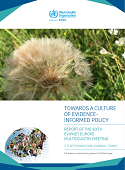Towards a culture of evidence-informed policy. Report of the 6th EVIPNet Europe multicountry meeting (2020)

Download
WHO was established in 1948 as the specialized agency of the United Nations serving as the directing and coordinating authority for international health matters and public health. One of WHO’s constitutional functions is to provide objective and reliable information and advice in the field of human health. It fulfils this responsibility in part through its publications programme, seeking to help countries to make policies that benefit public health and address their most pressing public health concerns.
The WHO Regional Office for Europe is one of six regional offices throughout the world, each with its own programme geared to the particular health problems of the countries it serves. The European Region embraces nearly 900 million people living in an area stretching from the Arctic Ocean in the north to the Mediterranean Sea in the south and from the Atlantic Ocean in the west to the Pacific Ocean in the east. The European programme of WHO supports all countries in the Region in developing and sustaining their own health policies, systems and programmes; preventing and overcoming threats to health; preparing for future health challenges; and advocating and implementing public health activities.
To ensure the widest possible availability of authoritative information and guidance on health matters, WHO secures broad international distribution of its publications and encourages their translation and adaptation. By helping to promote and protect health and prevent and control disease, WHO’s books contribute to achieving the Organization’s principal objective – the attainment by all people of the highest possible level of health.



